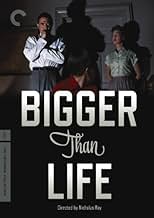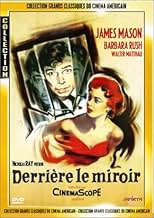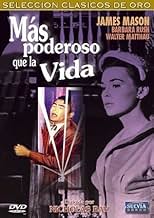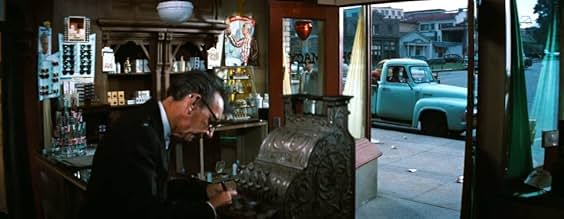IMDb RATING
7.4/10
8.6K
YOUR RATING
A seriously-ill schoolteacher becomes dependent on a miracle drug that begins to affect his sanity.A seriously-ill schoolteacher becomes dependent on a miracle drug that begins to affect his sanity.A seriously-ill schoolteacher becomes dependent on a miracle drug that begins to affect his sanity.
- Awards
- 2 nominations total
Robert F. Simon
- Dr. Norton
- (as Robert Simon)
David Bedell
- X-Ray Doctor
- (uncredited)
Gail Bonney
- Mother at PTA Meeting
- (uncredited)
Harold Bostwick
- Gentleman
- (uncredited)
Lovyss Bradley
- Churchgoer
- (uncredited)
Ann Cameron
- Churchgoer
- (uncredited)
Mary Carroll
- Mother at PTA Meeting
- (uncredited)
Virginia Carroll
- Mrs. Jones
- (uncredited)
Mary Carver
- Saleslady
- (uncredited)
Featured reviews
Back in 1956 this must have been a very daring flick indeed. Of course it has dated and today it packs less of a punch but it still remains a very sincere film anchored by a superb James Mason performance. Walter Matthau is similarly top rate though in a smaller and less flashy role. The direction is absolutely mesmerizing and I only felt slightly uneasy about the psychiatric approach of the day and the flashing red screen reflecting Mason's mental disintegration which was so in fashion in films of the time.
Even so, it was not enough to spoil the pleasure afforded by the many good aspects in this movie that I found quite riveting and intelligent for the most part. The bit where Mason snips the phone cord is as frightening as it is memorable, to me the highpoint of a honest yet never predictable work.
Even so, it was not enough to spoil the pleasure afforded by the many good aspects in this movie that I found quite riveting and intelligent for the most part. The bit where Mason snips the phone cord is as frightening as it is memorable, to me the highpoint of a honest yet never predictable work.
Nicholas Ray was one of the greatest directors to come out of Hollywood. His movies are always about something and that something has a cinematic flair that makes the experience thought provoking and thoroughly entertaining. Here is Cortisone the excuse for a slap in the face of a society that was getting more complacent and more spoiled with an avalanche of "new" things coming to overwhelm our daily lives. "We're dull, we're all dull" tells James Mason to his wife. Barbara Rush is superb as a Donna Reed type with a monster in the house. James Mason, a few years away from Lolita, also produced this rarely seen classic and gives a performance of daring highs. Highly recommended to movie lovers everywhere.
This film, much like the melodramas of Douglas Sirk, has far more going on than meets the eye. James Mason's character, after getting whacked out of Cortizone (a "Miracle Drug") indeed becomes hysterical and abusive. But he was made ill in the first place by the strain caused his intensely driven lifestyle, where he kept two jobs to finance his family's social and financial ascent.
What the viewer has to watch for is what his character says during his cortizone-induced delusions. His criticisms of his wife, kid, PTA and society in general are over-the-top, but essentially valid. It's a classic narrative device: by allowing a main character a way out of societal responsibility and place (In this case, being bombed on Cortizone), he is allowed to comment on and criticize American society directly without actually threatening the status quo. and in the case of 1950s America, that's a monolithic status quo to criticize.
What the viewer has to watch for is what his character says during his cortizone-induced delusions. His criticisms of his wife, kid, PTA and society in general are over-the-top, but essentially valid. It's a classic narrative device: by allowing a main character a way out of societal responsibility and place (In this case, being bombed on Cortizone), he is allowed to comment on and criticize American society directly without actually threatening the status quo. and in the case of 1950s America, that's a monolithic status quo to criticize.
James Mason produced the movie, suggesting to me that it was he who got this very noncommercial property filmed and released. It's a top-notch cast directed by cult favorite Nicholas Ray, but the material is a decided downer despite the originality. There were several films out at the time dealing with drug addiction (e.g. Hatful of Rain, Man with the Golden Arm). This, however, is the only one I know dealing with addiction to a prescription drug, Cortisone. Since similar attachments have spread over the decades, the theme has come to anticipate a more general social problem. Thus, its relevance carries over even for today's audiences.
Mason plays Ed Avery, a high-school teacher and normal family man. I like the way the screenplay works in the fact that he can't support a family on a teacher's income, and so has a second job as a cabbie. As a result, his day is filled from dawn to dusk. Small wonder, then, that he begins suffering blackouts, which doctors diagnose as a rare arterial disorder. (It's not made clear what has caused the problem. Overwork? Genetics?) A new drug, Cortisone, is prescribed for an indefinite period of usage. Up to now, Ed has been a friendly, well-liked family man and co-worker. So it's a harrowing trajectory to watch him go through increasingly intense periods of mental breakdown as a side effect of the new drug.
It's an excruciating descent into delusions of grandeur and megalomania, with few efforts at softening the agony. As the delusions mount, Ed abusively lectures a PTA meeting, berates and condemns his wife (Rush), becomes a Nazi-like taskmaster to his son (Olsen), and even tries to re-enact Abraham's sacrifice of son Isaac. Now, there were many so-called scary B- movies out at the time. But none, I believe, are any scarier than Mason's portrayal of the ravaged high-school teacher. Probably half the audience went home to check their medicine chest.
The only fault I find is with wife Lou's behavior. In my book, she's too passive to be believable in the face of the growing ordeal, especially as her son is affected. Ray brings out an unusual but expected degree of intensity in Mason's performance, with another of his trademarks centering on the action around the family staircase, perhaps symbolizing the mounting madness. Also, I wouldn't be surprised that Ray and Mason took a cut in pay to get the project made. The only concession to commercialism that I can spot is the expected 1950's ending, which nonetheless is more a relief than a disappointmenta tribute, I think, to the caliber of what's there on screen. Anyway, the movie comes across as an unusual and searing melodrama, prescient for its time.
Mason plays Ed Avery, a high-school teacher and normal family man. I like the way the screenplay works in the fact that he can't support a family on a teacher's income, and so has a second job as a cabbie. As a result, his day is filled from dawn to dusk. Small wonder, then, that he begins suffering blackouts, which doctors diagnose as a rare arterial disorder. (It's not made clear what has caused the problem. Overwork? Genetics?) A new drug, Cortisone, is prescribed for an indefinite period of usage. Up to now, Ed has been a friendly, well-liked family man and co-worker. So it's a harrowing trajectory to watch him go through increasingly intense periods of mental breakdown as a side effect of the new drug.
It's an excruciating descent into delusions of grandeur and megalomania, with few efforts at softening the agony. As the delusions mount, Ed abusively lectures a PTA meeting, berates and condemns his wife (Rush), becomes a Nazi-like taskmaster to his son (Olsen), and even tries to re-enact Abraham's sacrifice of son Isaac. Now, there were many so-called scary B- movies out at the time. But none, I believe, are any scarier than Mason's portrayal of the ravaged high-school teacher. Probably half the audience went home to check their medicine chest.
The only fault I find is with wife Lou's behavior. In my book, she's too passive to be believable in the face of the growing ordeal, especially as her son is affected. Ray brings out an unusual but expected degree of intensity in Mason's performance, with another of his trademarks centering on the action around the family staircase, perhaps symbolizing the mounting madness. Also, I wouldn't be surprised that Ray and Mason took a cut in pay to get the project made. The only concession to commercialism that I can spot is the expected 1950's ending, which nonetheless is more a relief than a disappointmenta tribute, I think, to the caliber of what's there on screen. Anyway, the movie comes across as an unusual and searing melodrama, prescient for its time.
This is an excellent movie. I saw it once, and I never wish to see it again. I grew up in a household like this, only there was never a solution to my father's mania, depression, and incredible anger.
About all I can say about Mr Mason's performance, and that of Ms Rush, is that they could have been my parents, and I could have been that kid. It never got to the point where I was offered up like Isaac, but the rest of it was right, right down to the speech where the father condemns all children because they're ignorant. I'd heard that one. His wife was helpless; they all are.
I do not know where the screenwriters got their dialog, but I hope they didn't learn it the way I did. As it happened, I was terrified and transfixed while watching it, only calming down after the father realized that something was wrong, and vowed to correct it, and there was a means of correcting it.
When the movie was over--I don't know if I watched it in the theater or on TV--I had to go home, where there was still rage, and no solution to it. I would have been nine years old.
There was a time that I wanted my parents to see that movie, in the hope that they'd realize that this was how they acted, and stop it.
It never happened. They were divorced years later. My father was angry and crazy right up to the day he died three years ago. My mother, in her nursing home in Cleveland, maintains that I must be making it all up.
M Kinsler
About all I can say about Mr Mason's performance, and that of Ms Rush, is that they could have been my parents, and I could have been that kid. It never got to the point where I was offered up like Isaac, but the rest of it was right, right down to the speech where the father condemns all children because they're ignorant. I'd heard that one. His wife was helpless; they all are.
I do not know where the screenwriters got their dialog, but I hope they didn't learn it the way I did. As it happened, I was terrified and transfixed while watching it, only calming down after the father realized that something was wrong, and vowed to correct it, and there was a means of correcting it.
When the movie was over--I don't know if I watched it in the theater or on TV--I had to go home, where there was still rage, and no solution to it. I would have been nine years old.
There was a time that I wanted my parents to see that movie, in the hope that they'd realize that this was how they acted, and stop it.
It never happened. They were divorced years later. My father was angry and crazy right up to the day he died three years ago. My mother, in her nursing home in Cleveland, maintains that I must be making it all up.
M Kinsler
Did you know
- TriviaThe main manufacturers of cortisone at the time, Merck in the US and Glaxo in the UK, were worried about the impact of this film on the public and their willingness to take the drug if prescribed by their physician. However, by the time of this film's release, newer and better formulations of the drug, along with greater knowledge of its uses and limitations had reduced (but not eliminated) the side-effects experienced by Ed in this film.
- GoofsWhen Ed has a barium X-ray, the image of the swallowed fluid is anatomically inaccurate. The fluid falls straight down to an extremely large "stomach" in his groin area.
- How long is Bigger Than Life?Powered by Alexa
Details
- Release date
- Country of origin
- Languages
- Also known as
- Bigger Than Life
- Filming locations
- Production company
- See more company credits at IMDbPro
Box office
- Budget
- $1,000,000 (estimated)
- Runtime
- 1h 35m(95 min)
- Color
- Aspect ratio
- 2.55 : 1
Contribute to this page
Suggest an edit or add missing content































